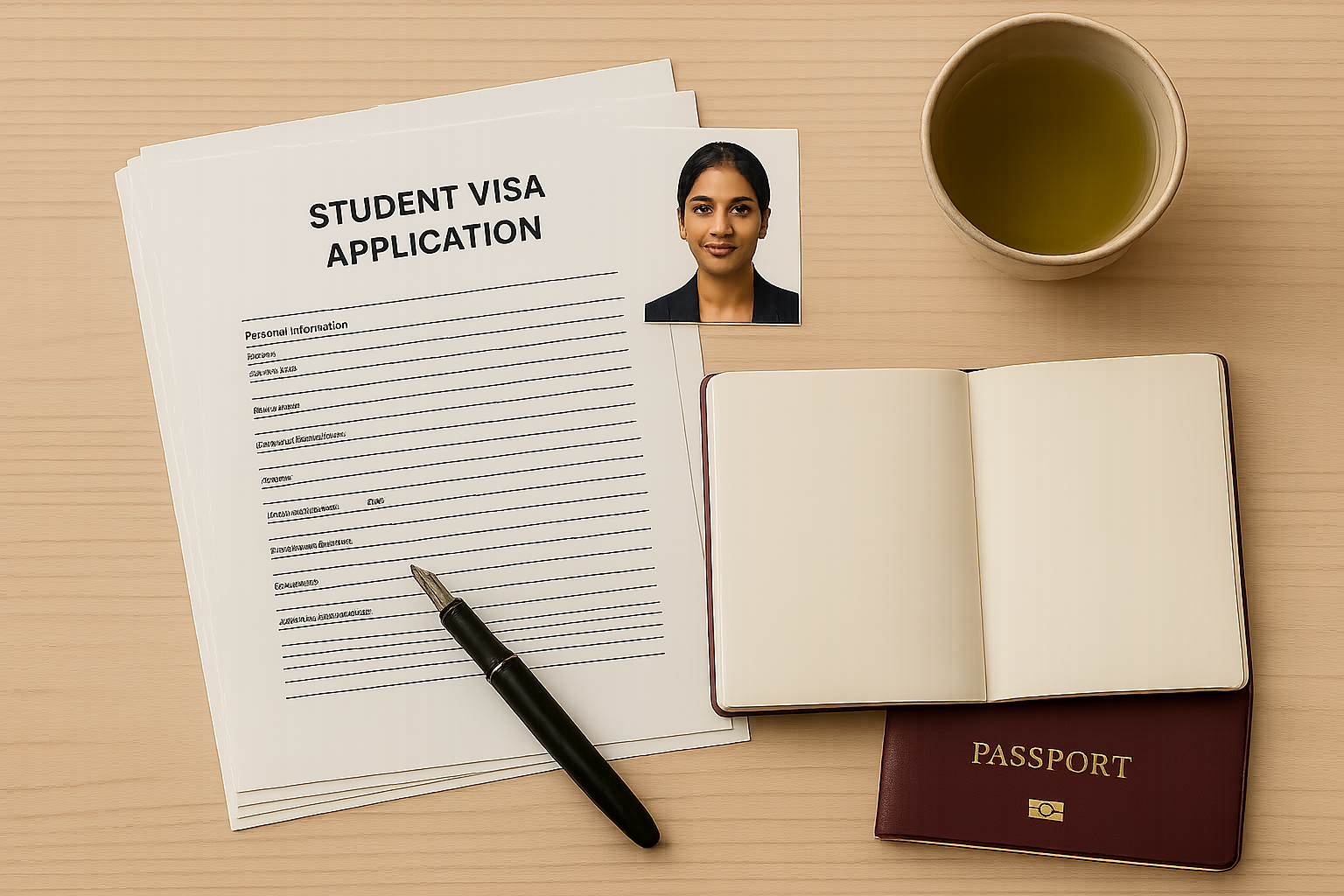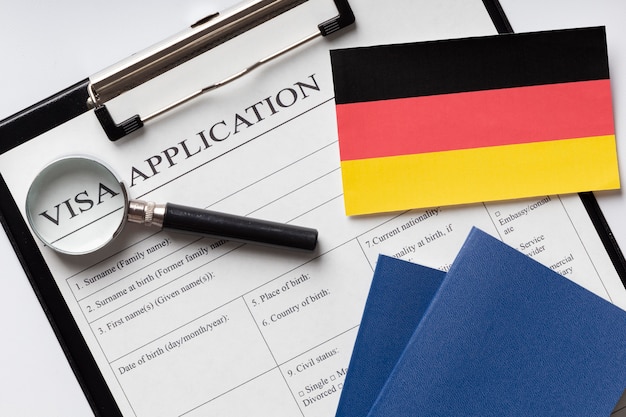If you’re an international student planning to study in Germany, understanding the different types of Germany study visas is essential for a smooth application process. Selecting the right Germany student visa ensures you meet all legal requirements and can focus on your academic journey. Below are the main German study visa types you should consider:
Additional contact and legal representation information: Click here to download
Declaration on true and complete information: Click here to download
Student Visa (Studentenvisum): (most popular amongst international students)
This is the primary visa for students accepted into a German university or higher education institution. It allows you to live and study in Germany for the duration of your program. To qualify, you must have a letter of admission from a recognized institution and prove sufficient financial resources. This visa allows you to stay for the duration of your studies and provides the flexibility to work part-time. 🔗 Download Student Visa Checklist
Language Course Visa (🔗Sprachrsvikusum):
If you plan to attend a language course in Germany before starting your degree program, this visa is for you. It is ideal for students who need to enhance their German language skills and wish to study at a language school or university-preparatory course. This visa is perfect for those intending to enroll in a German language course lasting more than 3 months. It is designed for students who want to improve their German before beginning a degree program.
Preparatory Course Visa (🔗Studienkolleg Visa):
For international students who must complete a preparatory course (Studienkolleg) before enrolling in a German university, this visa provides temporary residence to finish the required coursework. It is essential for those who need to meet specific academic or language prerequisites.
Research Visa:
If you’re coming to Germany for research purposes related to your studies or thesis work, this visa allows you to conduct research at a German institution or in collaboration with German researchers. It is tailored for international students involved in research programs or internships that require long-term stays. This visa supports research activities alongside your academic studies.
Student Exchange Visa:
If you’re participating in an exchange program through your home institution, you may need an exchange student visa. This visa is designed for short-term study abroad programs and ensures you can study and live in Germany for the duration of the program.

Each type of Germany study visa has specific requirements and application procedures, so it’s crucial to select the one that aligns with your educational plans. Be sure to check the latest regulations and consult with the German consulate or embassy for detailed information tailored to your situation. This knowledge lays the groundwork for a successful academic experience in one of Europe’s leading educational destinations.
Essential Documents for Your German Student Visa Application:
Before you can enjoy the rich academic and cultural experiences Germany has to offer, you’ll need to secure a student visa. To ensure a smooth application process, it’s crucial to have all the necessary documents prepared. Here’s a detailed checklist of the required documents for applying for a German student visa:
DOWNLOAD THE LATEST “GERMANY STUDENT VISA” CHECKLIST HERE 👇🏼
Valid Passport:
Your passport must be valid for at least 4 months beyond the date you plan to enter Germany. Ensure it has enough blank pages for the visa and entry stamps.
🔗 Check the passport requirements for visa here.
Visa Application Form
Complete the national visa application form, which can be downloaded from the German consulate or embassy website. Make sure to fill it out accurately and legibly.
🔗 Complete and sign the applictiton form.
Recent Passport-Sized Photographs
Provide two recent passport-sized photos that meet the biometric requirements. These should be high-quality and taken within the last six months.
🔗 Check Germany Visa photo requirements here.
Letter of Admission (University admission letter “Zulassungsbescheinigung”)
Submit a formal letter of admission from a recognized German university or educational institution. This document should confirm your acceptance into a course and specify the duration of your studies.
Proof of Financial Resources
Demonstrate that you have sufficient funds to cover your living expenses while studying in Germany. This can be shown through:
- A blocked account (Sperrkonto) with a minimum balance of approximately €11,904, or
- Letter of commitment by a resident 🔗 “Verpflichtungserklärung“: A person living in Germany, showing they’ll be covering your accommodation and/or other living costs while you’ll be here, or
- Proof of scholarship or funding: It must show you as a receiver and the amount of financial coverage granted to you by this scholarship.
Proof of Health Insurance
You need to provide proof of valid health insurance coverage for your stay in Germany. This can be either through a German statutory health insurance provider or an international health insurance policy that meets German requirements.
🔗 Check the requirements of Health Insurance for International Students
🔗Accepted Health Insurance for Indian Students
Academic Certificates and Transcripts
Include certified copies of your previous academic certificates and transcripts. These documents should be translated into German or English if they are not already in one of these languages.
Proof of Language Proficiency
Depending on your course, you may need to provide evidence of language proficiency in either German or English.
 Proof of English language proficiency:
Proof of English language proficiency:
- Test of English as a Foreign Language (TOEFL). Accepted results are PbT (paper-based test) 550 Points, CbT (computer-based test) 213 Points and IbT (internet-based test) 79-80 Points.
- The International English Language Testing System (IELTS). Accepted scores by German universities are 5 – 6.5.
 Proof of German language proficiency:
Proof of German language proficiency:
- German Language University Entrance Examination for International Applicants (DSH).
- Test of German as a Foreign Language (TestDaF).
- Goethe Institute German Language Diploma (GDS).
- German Language Diploma of the Standing Conference of the Ministers of Education and Cultural Affairs, Level II (DSD).
Motivation Letter
A well-written motivation letter explaining your reasons for choosing the specific course and university, and how it aligns with your career goals. This letter should highlight your enthusiasm and commitment.
Visa Fee Payment Receipt
Pay the visa application fee and include the receipt as proof of payment. The fee is typically around €75 but may vary depending on the consulate or embassy.
Additional Documents
Depending on your specific situation, you might be asked to provide additional documents such as a resume/CV or previous visa history.
Tips for a Successful Application
- Check the Specific Requirements: Each German embassy or consulate may have slightly different requirements. Always check their official website for the most accurate and up-to-date information.
- Start Early: Begin gathering and preparing your documents well in advance to avoid any last-minute issues.
- Ensure Accuracy: Double-check all forms and documents for accuracy and completeness to prevent delays in your visa processing.
By meticulously preparing these documents, you’ll set yourself up for a smoother visa application process and get one step closer to starting your academic adventure in Germany. Viel Erfolg (good luck)!
Need Assistance with Your Application?
- Filling out a visa application form can be intricate and time-consuming. Our experienced consultants are here to assist you with every step of the process. From ensuring that your application form is filled out correctly to providing guidance on compiling the necessary documents, we’ve got you covered.
- Our team is dedicated to helping you navigate the visa application process smoothly and efficiently, so you can focus on preparing for your academic journey in Germany. Contact us today to get expert assistance and ensure a successful visa application experience!
Everything You Need to Know About the German Blocked Account:
When planning to study in Germany, one of the essential requirements for obtaining a student visa is proving you have sufficient financial resources. A German blocked account is a popular way to meet this requirement. Below, we answer some of the most common questions about blocked accounts, including recent changes and how to manage your funds after arriving in Germany.
What is a German Blocked Account?
A 🔗 German blocked account (Sperrkonto) is a special bank account designed for international students. It is used to prove that you have sufficient funds to cover your living expenses in Germany. The amount required is approximately €11,904 per year. This account is “blocked” because you can only access a limited amount each month.
Why Do I Need a Blocked Account for My Student Visa?
The German authorities require proof of financial resources to ensure that students can support themselves while studying. A blocked account provides this assurance and is a mandatory requirement for obtaining a student visa. It helps in demonstrating financial stability to the visa authorities.
How Do I Open a Blocked Account?
To open a blocked account, you need to choose a bank that offers this service. Many banks in Germany and some international banks provide blocked account services. You will need to provide personal documents, proof of admission to a German educational institution, and the required amount of money.
What Documents Are Required to Open a Blocked Account?
- A valid passport.
- Proof of admission to a German university or educational institution.
- A completed application form from the bank.
- Proof of initial deposit.
How Much Money Needs to Be Deposited?
The standard amount required for a blocked account is approximately €11,904, which covers your living expenses for one year. This amount is adjusted periodically, so it’s important to verify the current requirement with your chosen bank.
According to German regulations, international students are required to have a minimum amount of funds to cover their living expenses in Germany. As of the latest standards, this amount is set at €992 per month.
Explanation:
- Monthly Requirement × Number of Months = Annual Requirement
- 992 € × 12 = 11,904 €
| Year | Monthly Amount | Annual Amount |
| Winter Semester 2024/2025 | €992 | €11,904 |
| 2024 | €934 | €11,208 |
| 2023 | €934 | €11,208 |
| 2022 | €861 | €10,332 |
| 2021 | €861 | €10,332 |
| 2020 | €853 | €10,236 |
| 2019 | €850 | €10,200 |
How Can I Access My Funds After Arriving in Germany?
Once you arrive in Germany, you can access your funds by following these steps:
- Visit the Bank: Go to the bank where you opened your blocked account.
- Provide Documentation: Present your passport, visa, and a copy of your confirmation letter from the blocked account.
- Unblocking the Account: Request to unblock the account or start the process to access your funds. Typically, the bank will allow you to withdraw a monthly amount up to a fixed limit.
For specific details on unblocking your account, consult the bank where you hold the blocked account or check their official website.
What If I Have Issues With My Blocked Account?
If you encounter any issues with your blocked account, such as difficulties accessing your funds or problems with the application process, contact the bank’s customer service or visit their branch. Additionally, you can seek advice from the German Federal Foreign Office or consult the 🔗 Germany Visa website for further assistance.
By understanding the requirements and processes related to the German blocked account, you can ensure a smoother transition to studying in Germany. If you need further help, feel free to reach out to the relevant authorities or financial service providers for support.



Leave a Comment: